Vol XXV, Issue 4 (Fall 2018): Winnie Madikizela Mandela
Vol. XXV, Issue 4 (Fall 2018): Winnie Madikizela Mandela (1937 -2018)
Table of Contents
Editorial by Prof. Gloria Emeagwali
Professor Victor Oguejiofor Okafor- “The Passing of Winnie Madikizela-Mandela:
The End of a Revolutionary Chapter in African History"
Dr. Awosika, Bridget Itunu- “Positivity, Strength and Possibilities Personified:
Winnie Madikizela Mandela and Her Many Endowments”
Editorial
On May 12, 1969, the South African apartheid state, in an act of terror, took Winnie Madikizela Mandela away from her two young daughters and shoved her in a security police vehicle. She became Prisoner Number 1323/69, and as pointed out in her autobiography, would spend the next four hundred and ninety one days, under a state of utmost brutality and cruelty. Prison food consisted of porridge with maggots or they would give the pork fat, “and the porridge would actually swim in this fat” along with the maggots (Winnie Madikizela Mandela, 2013: 62). On October 28, 1969,
Mrs Mandela, along with twenty one others, were dragged to court, having had neither a bath or shower for about two hundred days. They were charged under the Suppression of Communism Act and the Unlawful Organisations Act aimed at the African National Congress, in this case. They were also accused of conspiring to commit sabotage. They were released, re-detained, charged with five hundred and forty new offences by August 3, 1970 and then eventually released on September 14, 1970. Even so, by September 30, 1970, Winnie Mandela’s previous banning order was renewed for five years, and she was placed under house arrest (p. 248). Such was the life of intimidation and torture suffered by Winnie Mandela, from time to time, over four decades. She was a woman of courage and strength who was defiant, committed and determined to challenge the horrific system of apartheid.
We are fortunate in this issue of Africa Update, to have the expertise of Professor Victor Oguejiofor Okafor, Department of Africology and African American Studies, Eastern Michigan University, and, Dr. Awosika Bridget Itunu of Adeyemi College of Education, Ondo, Nigeria. These two scholars share their insights and knowledge about different aspects of the life of one of Africa’s greatest anti-colonial and anti-apartheid activists who passed away this year on April 3. We thank them sincerely for their contributions. For Winnie's final autobiography, see Mandela, W. 491 Days: Prisoner Number 1323/69. Johannesburg, South Africa: PicadorAfrica, 2013. Dr. Awosika Bridget Itunu provided all the photos on this site.
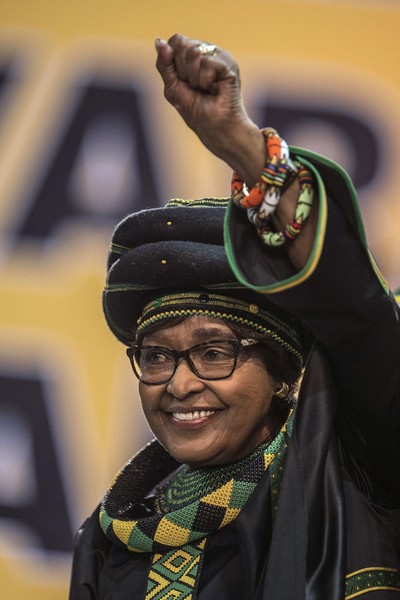
Professor Gloria Emeagwali, Chief Editor
“The Passing of Winnie Madikizela-Mandela: the End of a Revolutionary Chapter in African History”
Professor Victor Oguejiofor Okafor
Department of Africology and African American Studies,
Eastern Michigan University
The last time I checked, our planet had a human population of 7.7 billion (“Current World Population,” 2018). As human beings, most of us, that is the majority of earth’s 7.7 billion people, will eventually pass on almost unnoticed and uncelebrated. Across the ages, a few among the human inhabitants of earth spent their earthly lives in a manner that made a positive and memorable difference to the societies in which they lived. Such impactful and positive lives on earth that tended to change and transform the social conditions of fellow human beings or human communities/habitations for the better, invariably end up in immortality—that is, end up being continuously, fondly remembered in real time. From an African ontological perspective, achieving a niche in ancestral memory constitutes what it signifies for the departed to live in immortality.
A special crop of such ancestors end up as heroes and heroines in their communities in various spheres of life. We either celebrate such heroes or heroines annually for their contributions in the sociopolitical sphere like the Martin Luther Kings of the contemporary world, or we celebrate them for their path-breaking written ideas, discoveries, inventions, and works of wisdom. We do this from generation to generation in both formal and informal educational settings. Only a select crop of members of the human population across its various local, regional, national and/or international segmentations tend to ascend to this special place of honor, distinction and remembrance.
Within recent memory, one of the most distinguished members of this select club of human ancestors was a person, a world-famous woman, who passed-on April 3, 2018. That is, on that day, a saddened world received news of the demise of Winnie Madikizela-Mandela, age 81, the superheroine of a decades-old, bitter and intermittently bloody struggle that eventually brought an end to apartheid in South Africa in 1994 (Hilary Clarke, H., Curnow, R & McKenzie, D., 2018). What would posterity prize the most about this real iron lady of modern African history?
Having a distinction of shedding the last vestige of internal colonial occupation on the continent of Africa by achieving Black majority rule in 1994, South Africa is one of Africa’s 55 countries, which, with the exception of Ethiopia and Liberia, had to free themselves of Western European colonial occupation and rule either by protracted wars of liberation or through mass mobilization and protest action.
South Africa’s decades of struggle against apartheid (that is, a racist system of separate development premised upon a spurious notion of White racial superiority over Blacks) eventually metamorphosized into a global anti-apartheid movement that coalesced with effervescent, internal, progressive, transformative forces, to compel a mighty military, internationally well-connected, and a deeply entrenched sociopolitical order, known as apartheid, to buckle and pave way for a democratic transition to Black majority rule, in 1994.
Among other internal political organizations, the African National Congress (ANC) was a central internal force of change. External catalysts that contributed to that change included the then Organization of African Unity (OAU), which changed its name to the African Union in 2002, the United Nations Special Committee Against Apartheid (1963 to 1994), and a coalition of southern African countries known as the Frontline States, including Angola, Botswana, Mozambique, Tanzania, Zambia, and Zimbabwe, which dedicated themselves--often at the risk of attacks from the racist minority government of South Africa--to helping to bring down apartheid. Starting from the 1960s, successive governments of Africa’s most-populated West African country of Nigeria, lent significant and sustained material support to South Africa’s liberation struggles.
While the superhero of that struggle, the late Nelson Mandela was kept in political incarceration for 27 years, Winnie Madikizela-Mandela energetically and relentlessly kept alive the flame of that struggle. It was a turbulent journey for which, at various times, she was jailed, tortured and even banished by the apartheid regime. It was in 1977 that the apartheid government of South Africa banished Winnie Madikizela-Mandela until 1985 to Brandfort in the Orange Free State—a town dominated by Afrikaans-speaking South Africans in what was clearly an action meant to humiliate her and subordinate her to an Afrikaner community from whence came the primary architects of the racially repressive doctrine and system of apartheid. The house in which she was deposited, had no running water or electricity; it had neither floors nor ceilings. Strikingly notable is the fact that Winnie Mandela did not have to submit to that banishment: she gave up an option of either departing South Africa for Swaziland or relocating to Transkei, which, under apartheid, was classified as independent by the South African racist minority government (“Winnie Mandela is banished to Brandfort,” 2016). She selflessly remained in South Africa to keep the struggle alive—at a substantial personal cost!
Of key note as well is that not for one known moment did Winnie Mandela let the world forget about the prolonged travail of Mr. Nelson Mandela, her politically incarcerated husband--as attested by the sub-title of a 1985 book about her, Winnie Mandela: Part of My Soul Went with Him. In 1994, Mr. Nelson Mandela emerged as the first President of a Free South Africa, not long after being released from 27 years of political imprisonment. Not surprisingly, while Nelson Mandela richly earned an accolade of “Father of the Nation,” Winnie Madikizela-Mandela also rightfully came to be known as the “Mother of the Nation” of post-apartheid South Africa.
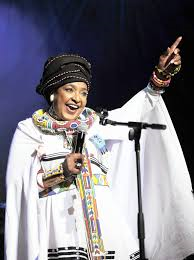
For Winnie Mandela, keeping up with politically imprisoned Nelson Mandela occurred at great personal costs, including the loss of her cherished social welfare job and other consequences. In his autobiography, A Long Walk to Freedom, Nelson Mandela recalls: “Winnie, I later discovered, had recently received a second banning order and had been terminated from her job at the Child Welfare Office as a result…The authorities were convinced that Winnie was in secret communication with me. Winnie loved her job as a social worker…” (1994, p. 402). Mr. Mandela then went on to describe the anguish and agony that he felt about being unable to lend a helping hand to a wife and family in distress: “The banning and harassment of my wife greatly troubled me. I could not look after her and the children, and the state was making it difficult for her to look after herself. My powerlessness gnawed at me” (1994, p. 402). For a typical, culturally-grounded African man, one’s family comes first; one’s family constitutes the center-piece of social life and makes life worth living. Taking all these social life vitals away from an independent-minded and culturally proud Mr. Mandela, and also stripping him of any and all options for playing his role as the keeper of the home, must have heaped untold and disabling havoc upon his psychological and emotional wellbeing. Apartheid was, indeed, an evil, demonic and dehumanizing system that demonstrably enacted and implemented rules that, in this instance, dishonored the social core of African social humanity. As Mr. Mandela himself ruefully recalls, in his autobiography, “I was entitled to have only one visitor, and to write and receive one letter, every six months. I found this one of the most inhumane restrictions of the prison system. Communication with one’s family is a human right” (1994, p. 399). Mr. Mandela could not be more correct in that regard.
Winnie Mandela’s commitment to Nelson Mandela in his greatest hour of need is best captured in Nelson Mandela’s own words:
From the moment Winnie learned we had been brought to the island, she had been trying to arrange a visit. As a banned person, Winnie had to receive a special dispensation from the minister of justice, for she was technically not permitted to communicate with me… Even with the help of the authorities, visiting Robben Island was not an easy proposition. Winnie always dressed up for prison visits and tried to wear something new and elegant. It was tremendously frustrating not to be able to touch my wife, to speak tenderly to her, to have a private moment together (1994, p. 401).
That was not all that Mandela recalls about his Robben Island traumatic confinement. Here is another example of a culturally affronting and psychologically torturing prison regulation to which the Mandelas were subjected: “Regulations dictated that conversation had to be in either English or Afrikaans--African languages were forbidden” (1994, p. 402).
Winnie Madikizela - Mandela was a world figure who literally dared and stood up to the gods of apartheid during a perilous time in the sociopolitical life of South Africa--a time period when it was not safe to stand tall as a Black person in that country.
Worthy of recall about that protracted era of mass oppression and nightmare for Africans in South Africa was the fact that the vast majority of Western powers allied themselves with the racist white minority regime in South Africa, primarily because of South Africa’s vast natural endowments. And, those Western powers also tended to classify the African freedom fighters as “terrorists” and threats to the global world order! On the other hand, during that time period, countries of the then Eastern Bloc, consisting of Eastern European countries and led by the then Soviet Union,[1] tended to lend both material and moral support to the struggle against apartheid. The western hemispheric country of Cuba, which was under the influence of the Eastern Bloc, particularly the then Soviet Union, also actively aided the anti-apartheid struggle.
However, as from the mid-1980s, a grassroots-led anti-apartheid wind of change swept through the Western world, including the United States, generating, in its wake, progressive transformations in foreign policy positions on South Africa. In the case of the United States, a grassroots-driven anti-apartheid movement forced the US government to gradually amend and shift its South African policies from erstwhile diplomatic support to imposition of economic sanctions, divestments of stock held in South African corporations or in multi-national corporations that had business links with South Africa, as well as placement of an arms embargo. The United States’ “Comprehensive Anti-Apartheid Act of 1986” was emblematic of this new posture and foreign policy shift. It’s believed within South African historiographic circles that such economic sanctions generated a cumulative contribution of compelling the long-stubborn apartheid regime of South Africa to enter into political negotiations that paved way for eventually bringing an end to apartheid and ushering in the current era of Black majority rule, starting with the ground-breaking election of 1994.
Winne Madikizela-Mandela’s sacrifices, her resoluteness, her unflinching commitment to a struggle to free her people from the bondage and indignity of apartheid—without demonstrably caring about her own safety and comfort—produced, in this writer’s view, a net effect of helping to steer and influence the evolution and texture of human conscience in the 20th century. What is life about, and why are we here? As captured by Anne Benjamin in her afore-mentioned 1985 portrayal of Winnie Madikizela-Mandela’s life, this woman, this mother, this political warrior:
Lived under a ban for the greater part of her adult life, with countless arrests, imprisonment shortly after her marriage, while expecting her first child, constant surveillance for the last twenty years-two; cross examination and torture, a marriage which during the last twenty years, has consisted of nothing but censored letters, casual glances and brief conversations through the glass partitions in the visitors’ rooms of prisons under the watchful eyes of prison officers; separated from her husband and often from her children, family and friends as well (1985, p. 13).
Winnie Madikizela-Mandela fearlessly confronted and spoke truth to power during a period when an arrogant, conscienceless, blood-thirsty and Black-loathing apartheid regime in South Africa intimidated many less courageous men and women into obsequious silence.
The State hounded Winnie Madikizela-Mandela all her life—even in the twilight years of political apartheid, for in 1991, in a case that demonstrated the potency of the legacies of a deeply-entrenched and coercive apartheid bureaucratic underpinning, she was convicted for charges of “kidnapping and being an accessory in the beating of four youths at her Soweto home” (p. 2), a disputed conviction as noted by the then President of South Africa, Nelson Mandela who stated clearly that “her innocence was not in doubt” (2000, p. 585). In an article in the International Journal of African Historical Studies, Helena Pohlandt-McCormick observes the depth of a pattern of years of State machinations against Winnie Madikizela-Mandela:
This paper presents evidence that the decline of Winnie Madikizela-Mandela’s reputation has its roots much earlier than people have assumed. In my research into the origins of the Soweto Uprisings of 1976 I found evidence that she was the target of attempts by the state, and possibly the ANC, to discredit and sideline her even then. This article tells the story of those days in the mid-1970s and suggests the possibility that Winnie Madikizela-Mandela, like many other women involved in political struggles against colonial regimes, has been the target of ongoing state violence and of state and media efforts to depict her as a `wicked’ woman (2000, p. 586).
Thus, to almost an incredible degree and against the backdrop of ceaseless state persecution and torture, for which no state authority has demonstrably been held accountable, Winnie Madikizela-Mandela subordinated her material wellbeing and personal freedom to the human interest and yearning of her people to be liberated from the shackles of apartheid. In her book, Winnie Madikizela-Mandela: A Life, Anné Mariè du Preez Bezdrob appropriately notes that “I have come to know that the human spirit can be temporarily subdued by terror and hardship, but never conquered irrespective of the duration or form of the oppression” (2004, p. xi ). Anné Mariè du Preez Bezdrob was not merely theorizing. She derived that insight from both her encounters with war in Namibia, Zimbabwe and Bosnia and also from her studies of political oppression and racism. A South African herself, Anné Mariè du Preez Bezdrob witnessed first-hand, the system of political oppression and racial degradation known as apartheid, a blood-thirsty political-cum- military machine that systematically and cruelly extinguished the lives of many South African freedom seekers, like Bantu Stephen Biko of the Black Consciousness Movement who died while in police detention. Anné Mariè du Preez Bezdrob compares Winnie Madikizela-Mandela’s selfless and dangerous struggle “to keep alive the struggle against apartheid” to similar heroic contributions made by notable women in several theatres of war and oppression across the globe. As she poignantly concludes, Winnie Madikizela-Mandela, like those warrior women, “chose to confront oppression and injustice when it is safer to turn and look the other way” (p. xi).
Winnie Madikizela-Mandela’s defiance of apartheid was legendary. She traversed roads that most mortals would not dare. For instance, while the African National Congress (ANC) was still a banned political organization in South Africa, the apartheid state prohibited all memorabilia associated with it. Thus, it was against the unjust laws of the state of South Africa for a person to wear African National Congress (ANC) t-shirts, fly ANC flags or adorn or display ANC colors of green, gold and black, but Winnie Madikizela-Mandela did all that, plus more (Ramphele, 1996, p. 104).
Winnie Mandela spent more than a year in solitary confinement but remained unbroken:
The years of imprisonment hardened me ... Perhaps if you have been given a moment to hold back and wait for the next blow, your emotions wouldn’t be blunted as they have been in my case. When it happens every day of your life, when that pain becomes a way of life ... there is no longer anything I can fear. There is nothing the government has not done to me. There isn’t any pain I haven’t known. (“Winnie Madikizela-Mandela dies aged 81,” 2018).
Indeed, South Africa, Africa and the world-at-large have lost one of the greatest and yet selfless political giants that shaped the trajectory of human history in the 20th century. Like her late ex-husband and political warrior (Winnie and Nelson got divorced in 1996), Winnie Madikizela-Mandela’s entire life was a life of struggle, a life of living and working for the betterment of others, and not for self. She was a rare gem that embodied uncanny bravery, self-abnegation, a love of community that transcended self-love contrary to a dominant human trait that tends to place self-love above love of the community, intellectual acumen, charming oratory, political wizardry, and a passion for social justice, a deep love of freedom, charisma and physical beauty. Winnie Madikizela-Mandela was one of the most beautiful women that ever lived! Despite all these attributes, she led a humble life and demonstrably felt at home with the grassroots.
On April 13, 2018, the United Nations organized a “Special Memorial for Mama Winnie” during which one of the speakers succinctly summed up Winnie Mandela’s life as a visionary and a leader, who displayed:
a distinctive capacity for linking revolutionary thinking with resolute actions of defiance. She became a transformative leader for the women and men of an oppressed nation. And, when the leadership of the ANC was jailed for life or sentenced to exile, by the sheer force of her personal power of resistance, she rallied a despondent nation to continue the struggle (“UN Special Memorial for Mama Winnie,” 2018).
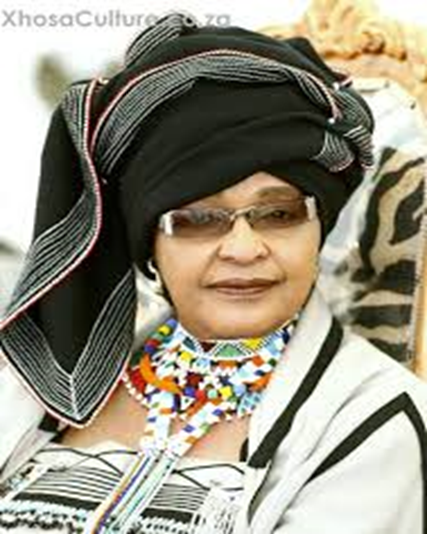
For Africa, the passing of Winnie Madikizela-Mandela meant the departure of a true warrior, a quintessential political activist, a true daughter of Africa, a jewel, a real-life superheroine! No doubt, Winnie Madikizela-Mandela’s journey back to eternal home was one that prodigiously merited a colorful ancestral welcome marked by blaring trumpets, pomp and pageantry. May her great and lion-hearted soul rest in perfect peace!
[1] The Union of the Soviet Socialist Republics (USSR) was dissolved in 1991. The Russian Federation is what remains of it.
*Email: vokafor@emich.edu
Phone: 734.487.3460
References
Benjamin, A. (Ed.). (1985). Winnie Madikizela-Mandela: Part of My Soul Went With Him. London: W.W. Norton & Company.
Hilary Clarke, H., Curnow, R & McKenzie, D. (2018, April 2). Winnie Mandela, South African anti-apartheid crusader, dies at 81. CNN.
Mandela, N. (1994). Long Walk to Freedom: the Autobiography of Nelson Mandela.New York: Little, Brown & Company.
Pohlandt-McCormick, H. (2000). Controlling Woman: Winnie Madikizela-Mandela and the 1976 Soweto Uprising. The International Journal of African Historical Studies, 33(3), 585-614. doi:10.2307/3097436.
Preez Bezdrob, A. (2004). Winnie Madikizela-Mandela: A Life. Cape Town: Zebra Press.
Ramphele, M. (1996). Social Suffering. Daedalus, 125 (1), 99-117.
“UN Special Memorial for Mama Winnie.” The United Nations, 13 April, 2018, https://www.youtube.com/watch?v=rD42sbrOIQk.
“Winnie Madikizela-Mandela dies aged 81.” The Guardian 2 April 2018. https://www.theguardian.com/world/2018/apr/02/winnie-madikizela-mandela-dies-aged-81.
“Winnie Mandela is banished to Brandfort.” South African History Online (SAHO), 16 September, 2016. https://www.sahistory.org.za/dated-event/winnie-mandela-banished-brandfort.
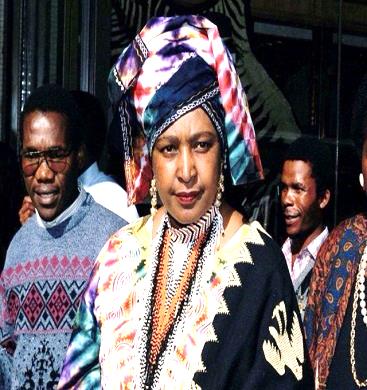
“Current World Population.” Worldometers, Accessed 25 September, http://www.worldometers.info/world-population/.
“Positivity, Strength and Possibilities Personified: Winnie Madikizela Mandela and Her Many Endowments”
Dr. Awosika, Bridget Itunu
Adeyemi College of Education,
Ondo, Nigeria.
Winnie Madikizela-Mandela, the human activist, and former wife of the late Nelson Mandela, who was born in 1937, died after a ‘brief illness’ at the age of 81. Winnie Mandela will be first and foremost remembered for the victorious fight against apartheid and the achievement of Independence in South Africa. She earned the accolade, ‘heroine,’ by struggling and working assiduously with her former husband to fight for the country's liberation from apartheid rule.
As a fashionista, Madikizela-Mandela’s varied costumes, recalled key moments in her unique life story that spanned her activities from that of a freedom fighter, to First Lady, reflecting South Africa’s momentous changes and experiences while Winnie lived! According to a BBC report (2014), the influence of Winnie Mandela’s distinguished style of dressing ranged from combat fatigues, Che Guevera-style berets, matronly suits, and striking animal prints - depending on what was called for in a particular political moment. Her couture has been described as unprecedented and unrivalled. She wore ever vibrant styles that were used to amplify her image. Ruth Carter, the costume designer of the recent box-office smash, Black Panther, named her as an “inspiration” for the film's costumes. ….” She was the Greatest Style Inspiration for “Black Panther” (Jeff & Getty, (2018). Earlier, Ruth Carter who served as the costumier for “Black Panther” told The Hollywood Reporter that she looked to the late activist specifically when creating ensembles for Angela Bassett.
Source: Dave M. Bennett/Getty Images (2014)
Diana Cilliers, who created the costumes for Justin Chadwick's – Mandela: Long Walk to Freedom confirmed the regal style of both Winnie Madikizela-Mandela and her husband Nelson Mandela. When the film was released, Winnie and Nelson Mandela were referred to by Cilliersas "incredibly stylish. Everything was beautifully matched, particularly the beaded Xhosa necklace she wore in court.
Diana Cilliers attested to the fashion taste of the one-time couple particularly on their commissioning him to produce the memorial costume worn at the release of Nelson Mandela from prison. The peculiar costume was part of the outstanding regalia used in the film: ‘Long Walk to Freedom’ and when the film was released; "both Winnie and Nelson Mandela were very well-dressed up. The New York Times (2013) succinctly confirmed that the outfit would forever be remembered as one of the regal collections of the Mandelas.
In the words of a supermodel, Naomi Campbell, Winnie Madikizela-Mandela was an inspiration and a friend who was well cherished. She was a woman of strength that endured much hardship and sacrifice. These attributes were confirmed by Winnie Mandela, when, as one of the most prolific and outspoken icons of the struggle/movement, she wore traditional outfits and accessories during a time when donning cultural wear was seen as a political taboo. As a Cultural Icon, her respect and love for African culture was seen in the amount of her African attires and costumes . Even when dressed in the latest fashion, Madikizela-Mandela often reflected her African roots with her choice of beaded jewellery or head wraps which she continued to wear throughout her life.
Her former husband, Nelson Mandela, also famously wore a Xhosa outfit to court in 1962, when he was tried for leaving the country without a valid passport. Madikizela-Mandela reaffirmed his point by donning traditional dress, too. At a meeting in honor of Nelson Mandela at Freedom Park in Pretoria, on November 5, 2009, the Madiba explained the symbolism of his outfit thus: "the ‘kaross’ was ... a sign of contempt for the niceties of white justice. I well knew the authorities would feel threatened by my ‘kaross’ because often, many whites feel threatened by the true culture of Africa."
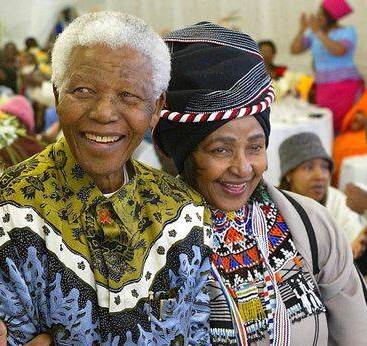
Source: https://i.pinimg.com/originals/e3/ea/47/e3ea47cee89893d9bffc9528e461f20c.jpg
Winnie, Strength and Womanhood in South Africa and Africa
Winnie made South African women believe in who they were and made traditional wear acceptable on all occasions. She went against the status quo at that time because dressing used to be “black tie, tux and European dress codes, but Winnie stood firm,” said designer Sonwabile Ndamase, who had dressed Madikizela-Mandela since the 1980s. Despite the dissolution of her marriage to the ANC leader- (Nelson Mandela), she boldly declared that this was one of her great experiences, as a mark of respect for that marriage. Madikizela-Mandela was famed for always showing off her loyalty to the ANC party by incorporating its colors into all her outfits. She was a great humanist, a philanthropist and helper of widows, including those who were victims of the 2012 Marikana massacre. Such attributes of hers proved that even at the age of 80, she was still committed to the resistance and fight against human rights violations.
Madikizela-Mandela unintentionally was a style icon with a vivid wardrobe that was linked to her message of empowerment and perseverance.
Winnie at a Rally with South African Widows
Though, Winnie once opened up on her being stylish, by saying she was only putting on whatever her designers made for her, as dictated by the occasion she had to attend - from power suits to gowns, sunglasses to headgear - it was her willingness to experiment that made her a true style icon. Cilliers on her own account referred to Madikizela-Mandela, as "incredibly stylish," because "everything that beautifully matched was found in the totality of her dressing including her traditional African head gear.”
Several encomiums were poured to commemorate her legacy and influence. Her aggressive approach in championing the end of apartheid in South Africa earned her a lot of respect from people in every walk of life. Her speech to her guests during the joyous occasion of her 80th birthday must be documented, because apart from her everlasting beauty, vitality and radiance at the event, Madikazela-Mandela looked as ageless as ever, wearing an elegant white and blue gown. In response to all the accolades and encomiums on that birthday, Winnie was quoted as saying: “I have to keep pinching myself to find out whether I’m really still alive…..I’ve never heard of such accolades when a person is still alive, especially someone like me who always offends one person or another whenever I speak.” Lamola ( 2016).
Winnie the Excellent Humanist
She must have taken people by surprise with the above statement. Being a strong politician and political analyst, the expectation was that she would center her 80th birthday speech on the political situation of the country, but, on the contrary, she didn’t use her birthday speech to address political issues. Rather, she began her speech by saying: “I am not going to say anything about Marikana today, and I am not going to talk about the leadership in the country and the weakening rand,” rather; the widows and orphans in the land were her concerns. She changed the discussion to her intended efforts to help the widows and orphan. “Her greatest accolade came when she mentioned that she had to ensure that Madiba [her late ex-husband Nelson Mandela] would never be forgotten, that his name would remain on the lips of the oppressed people of the world.”
According to Fapohunda (2018), the late anti-apartheid heroine, Winnie Mandela was not just a historical icon of our time, but an astute politician, a powerful dresser, the great orator, and the most popular of all Africa’s Heroines. She will be remembered as an Amazon for her good deeds towards the liberation of Africa from colonialism, liberation of women from patriarchy, and the the strongest female voice against the oppression of widows and orphans.
Winnie Mandela’s Death and Challenges to Nigerian Women
Nigeria’s Sunday Vanguard has observed that ironically, in the 21st century, the Nigerian woman seems to have lost her voice in a society that is in dire need of social justice, particularly in the age of feminism. The situation is more worrisome, given that the participation of women in governance, and the decision making process, are major goals in the Global Development Agenda, as embodied in the Sustainable Development Goals (SDGs). It has then become pertinent that women need to rise. More Winnie Mandelas must spring up with strong voices of hope. Nigerian women should be able to learn from Winnie who was of the strong opinion that if we organize and work together, we can defeat all negative tendencies that hinder the quest for equity and justice. They need to keep up the struggle for a better Africa and make the best they can by sticking together.
Winnie Mandela fought on the front line and from underground, hence it is very apt, at this time that we are preparing for another election in the country and judging by the unimpressive happenings in the history of women in politics between 2007 and 2015, to gear women up to become more assertive, and know that “if you have a trumpet with good sounds, you are to blow it by yourself.”
The Stylish Winnie Madikizela:
Lessons for African Women
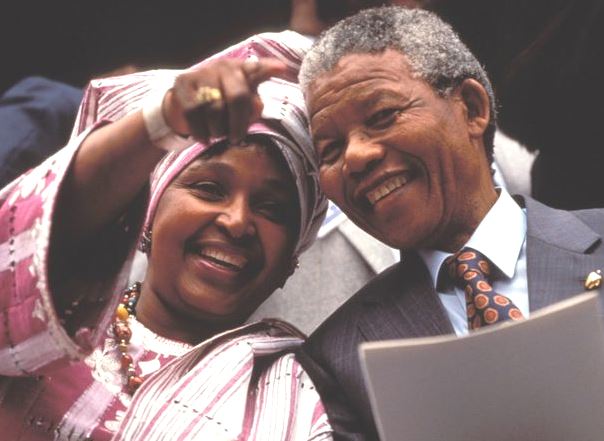
There are a lot of lessons to be learnt by everyone, especially women in politics. Politics should not be played the way women play it in Nigeria, rather women should follow Winnie’s steps. She was not given her role in politics on a platter of gold. She fought and earned it because of “ her consistency and radical disposition.” (Oke-Odumakin, 2018). She was not just a model for African women but the world!. Other significant lessons taught by Winnie were that human and socialist principles were the most important foundations for any society, as the founding principles needed to endlessly defend the rights of people (Oke-Odumakin). African women should demand and set as priority for the nation, the care of peoples’ basic needs, most especially the well-being of all Nigerians. “Winnie Mandela was a die-hard advocate of equitable distribution of the South African resource” as equitably as possible, taking care of education‚ health and housing for all‚ which are priorities for all nations (Oke-Odumakin).
Creation of a New Social Order
It will be very painful if in the same country and continent where women had dared patriarchy and stereotypes to enthrone a new social order, the legacy built for women’s rights would die, along with Winnie!. The question for every African woman is as follows: Why is the resilience that made great women like Queen Amina, Queen Idia, Moremi of lfe, Emotan of Benin, Omu Okwei of Ossomari, Alimotu Pelewura, Margaret Ekpo, Fumilayo Ransome-Kuti, Hajia Gambo Sawaba, and Kudirat Abiola - the stars of the struggles and triumphs of their times- absent today?
African women should remember that Winnie Mandela is a reference point today because she stood for transformational ideals that are in great contradistinction to patriarchy, non-inclusive policies, absence of courage, and activities that could undermine the growth of African women- including the lack of trust in the system, which made her to matter a lot to Nigerian women. These are the reasons Nigerian women must rise and take up the mantle to liberate fellow African women. The attributes which Winnie Mandela combined - beauty, strength, style, resilience, optimism and consistency- made her emerge as the most transformational woman in 20th and 21st century Africa. She echoed the aspirations, fears and frustrations of the ordinary man and woman in the face of danger. Such roles in African politics and social work, had enormous impact on gender roles and politics.
Assertiveness against State-Sponsored Oppression
Women should stand to face and deface state-sponsored tyranny by emulating Winnie Mandela’s defiance in challenging the status quo, as a social crusader and politician whose statements were crucial to the making of a democratic South Africa (Umemezie, 2018). No wonder there were many unforgettable funerary tributes and encomiums on her including that of Graca Machel:
“Fortunately, stars shine brightest during the darkest of hours. I know you will continue to illuminate our sky, even through the storms and clouds. Your legacy will be an uplifting beacon from which we can continue to draw guidance and strength during difficult times” (Machel, 2018).
Tribute on Commitment to Social Justice
Mama Winnie was a source of inspiration whose environment contributed to making her the brand she was. She was an activist, a mother, a good wife who was consistently steadfast on agreed political ideology, all through the twenty seven years that Mandela was imprisoned; a strong and most powerful grassroots politician: an epitome of a woman who could combine all these attributes to have a voice in the society. As pointed out by the Executive Director, Women Advocates Research and Documentation, she was not just anybody in the history of South Africa or Africa, she was a nationalist and Africanist, who was able to make a difference (Akiyode-Afolabi, 2018).
Conclusion
Winnie Madikizela Mandela is best described as a heroine of all trades and master of them all! Her passage is indeed an auspicious event to interrogate the 21st century role of women in Africa within spaces like politics, business, cultural sustainability, aesthetics and nation building.
* E-mail: bridy.4real@gmail.com
Phone: +2348034066306
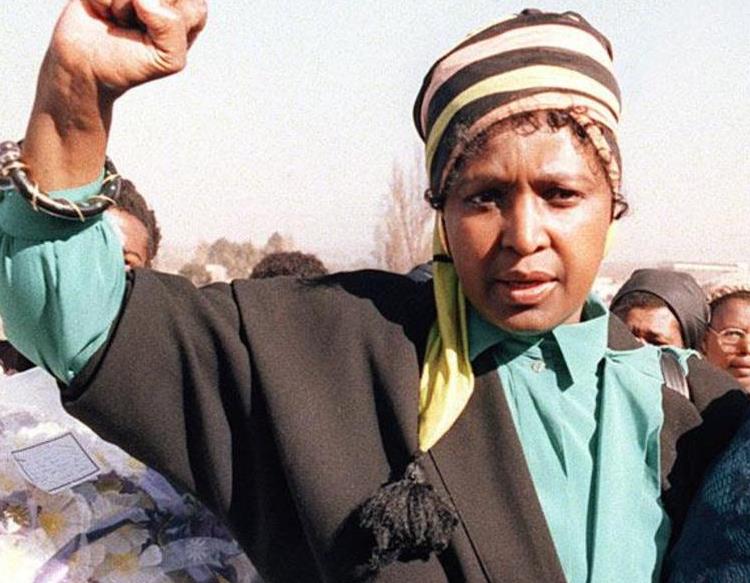
References
Akiyode-Afolabi, (2018): Executive Director, Women Advocates Research and Documentation,British Broadcasting Corporation (BBC) (2014): BBC Report
Campbell, Naomi (2018): Winnie Mandela was a woman of strength who endured much hardship and sacrifice. Retrieved 3/3/18
Darrisaw, Michelle (2018): Winnie Mandela’s 80th Birthday Speech. Essence Magazine, 3rd of April, 2018 from: https://www.essence.com/culture/watch-winnie-mandela-80th-birthday-speech.
Fapohunda, Tinuke (2018): Women’s inequitable gender relations, their poverty and powerlessness in the society are interconnected.
GALLERY (2018): The many looks of Winnie Madikizela-Mandela. Retrieved 26/5/18 from: https://www.timeslive.co.za/sunday-times/lifestyle/fashion-and-beauty/2018-04-04-winnie-madikizela-mandela-perfected-the-art-of-power-dressing/.
Gloria Umemezie, (2018): The making of a democratic South Africa
Jeff J. Mitchell & Getty (2018): Black Panther
Lamola, Herold (2016): Maps Maponyane September 14, (2016)
Odumakin, Afolabi (2018): Late Winnie Mandela- Matters Arising from:
https://www.vanguardngr.com/2018/04/winnie-mandela-matters-nigerian-women/’
Sam Reed (2018): Winnie Mandela's Vibrant Style Amplified Her Message. Retrieved from: https://www.hollywoodreporter.com/news/winnie-mandelas-vibrant-style-amplified-her-message-1098991.
The Hollywood Reporter (2018): “Winnie’s way of looking at clothes.
The New York Times (2013): Winne and Her Style statements.
Umemezie, Gloria (2018): Founder of Gender Affirmative Summit. Retrieved from: https://i.pinimg.com/originals/e3/ea/47/e3ea47cee89893d9bffc9528e461f20c.jpg

